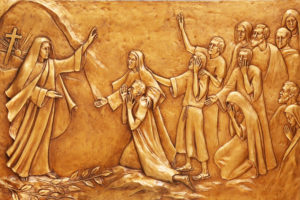Background and Rationale for Restoring John’s Gospel on Easter Sunday

Currently, the Standard Roman Catholic Lectionary calls for only the first half of John’s resurrection narrative (John 20:1-9) on Easter Sunday morning.
Verse 10 is never read and the rest of the narrative (verses 11-18) is not read on any Sunday — but instead is read on Easter Tuesday. Years ago, the days of Easter Week were holy days of obligation, and so all Catholics would have heard John 20:11-18 on Easter Tuesday. Yet, because Easter Tuesday is no longer a holy day of obligation, the vast majority of Roman Catholics never hear John’s full resurrection narrative as told in 20:1-18 and never hear the story of Mary of Magdala’s witness of Jesus’ resurrection nor Jesus commissioning her to deliver the news of his resurrection to the community.
In Canada, the entire narrative is read on Easter Sunday. In 1992 the Canadian Catholic Bishops updated their lectionary to include John’s full resurrection story. This amendment restored the story of the Apostle to the Apostles to its prominent role in the lectionary. Thus Canadian Catholics hear the whole story and learn from Jesus’ example of inclusive ministry and his faith in the leadership of women.
Importance of John 20:10-18
For centuries, Mary of Magdala has been misidentified as a repentant prostitute, thus damaging and diminishing her role as an early and important leader in the historical memory of the Church. The truth is that Mary of Magdala is expressly identified as one of the women who refused to leave Jesus during his crucifixion and death on the cross, in contrast to the male disciples who are depicted as scattering and even denying Jesus. All four Gospels explicitly point out that Mary was present at the tomb on Easter morning and in John’s account she is the first witness to the resurrection of Jesus.
John 20:10-18 is significant because it makes clear that only Mary of Magdala was in the garden with Jesus and that she was directly commissioned as the primary apostolic witness to the community. It is John’s account of Jesus’ inclusive model of leadership that most strikingly and without reservation portrays Mary of Magdala, a woman, as the primary witness of the resurrected Jesus and the first one commissioned by him to “go to my brothers and say to them, ‘I am ascending to my Father and your Father, to my God and your God’ (Jn 20:14-17).”